 W
WThis list of books by Martin Luther contains a bibliography of the works of Martin Luther in print, online or other formats, in English translation and original language. Martin Luther resisted the publication of a combined edition of his works for multiple reasons, although it finally consented to write a preface to such a publication in 1539.
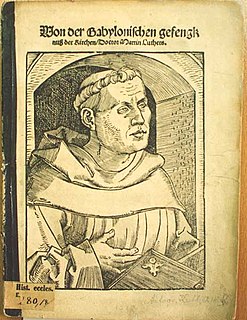 W
WPrelude on the Babylonian Captivity of the Church was the second of the three major treatises published by Martin Luther in 1520, coming after the Address to the Christian Nobility of the German Nation and before On the Freedom of a Christian. It was a theological treatise, and as such was published in Latin as well as German, the language in which the treatises were written.
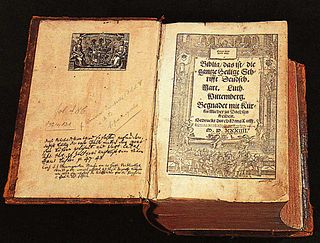 W
WThe Luther Bible is a German language Bible translation from Hebrew and ancient Greek by Martin Luther. The New Testament was first published in 1522 and the complete Bible, containing the Old and New Testaments with Apocrypha, in 1534. It was the first full translation of the Bible into German based mainly on the original Hebrew and Greek texts and not the Latin Vulgate translation.
 W
WLuther's Large Catechism is a catechism by Martin Luther. It consists of works written by Luther and compiled Christian canonical texts, published in April 1529. This book was addressed particularly to clergymen to aid them in teaching their congregations. Luther's Large Catechism is divided into five parts: The Ten Commandments, The Apostles' Creed, The Lord's Prayer, Holy Baptism, and The Sacrament of the Eucharist. The Catechism, along with related documents, was published in the Book of Concord in 1580.
 W
WLuther's Small Catechism is a catechism written by Martin Luther and published in 1529 for the training of children. Luther's Small Catechism reviews the Ten Commandments, the Apostles' Creed, the Lord's Prayer, the Sacrament of Holy Baptism, the Office of the Keys and Confession and the Sacrament of the Eucharist. It is included in the Book of Concord as an authoritative statement of what Lutherans believe.
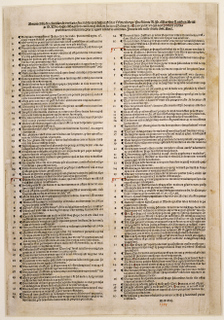 W
WThe Ninety-five Theses or Disputation on the Power and Efficacy of Indulgences is a list of propositions for an academic disputation written in 1517 by Martin Luther, professor of moral theology at the University of Wittenberg, Germany. They advance Luther's positions against what he saw as the abuse of the practice of clergy selling plenary indulgences, which were certificates believed to reduce the temporal punishment in purgatory for sins committed by the purchasers or their loved ones. In the Theses, Luther claimed that the repentance required by Christ in order for sins to be forgiven involves inner spiritual repentance rather than merely external sacramental confession. He argued that indulgences led Christians to avoid true repentance and sorrow for sin, believing that they could forgo it by purchasing an indulgence. These indulgences, according to Luther, discouraged Christians from giving to the poor and performing other acts of mercy, believing that indulgence certificates were more spiritually valuable. Though Luther claimed that his positions on indulgences accorded with those of the Pope, the Theses challenge a 14th-century papal bull stating that the pope could use the treasury of merit and the good deeds of past saints to forgive temporal punishment for sins. The Theses are framed as propositions to be argued in debate rather than necessarily representing Luther's opinions, but Luther later clarified his views in the Explanations of the Disputation Concerning the Value of Indulgences.
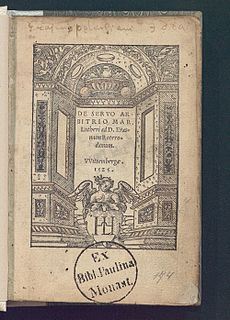 W
WOn the Bondage of the Will, by Martin Luther, was published in December 1525. It was his reply to Desiderius Erasmus' De libero arbitrio diatribe sive collatio or On Free Will, which had appeared in September 1524 as Erasmus' first public attack on Luther. At issue was whether human beings, after the Fall of Man, are free to choose good or evil. The debate between Luther and Erasmus is one of the earliest of the Reformation over the issue of free will and predestination.
 W
WOn the Jews and Their Lies is a 65,000-word anti-Judaic and anti-Semitic treatise written in 1543 by the German Reformation leader Martin Luther (1483–1546).
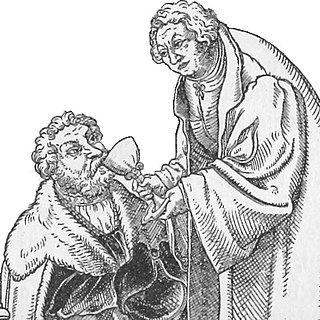 W
WThe Sacrament of the Body and Blood of Christ—Against the Fanatics is a book by Martin Luther, published in late September or early October 1526 to aid Germans confused by the spread of new ideas from the Sacramentarians. At issue was whether Christ's true body and blood were present in the Lord's Supper, a doctrine that came to be known as the sacramental union.
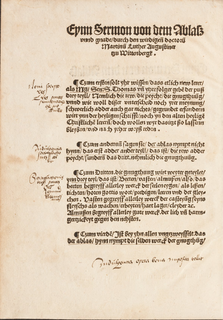 W
WMartin Luther's Sermon on Indulgences and Grace is a pamphlet written in Wittenberg in the latter part of March, 1518 and published in April of that year.
 W
WVom Schem Hamphoras, full title: Vom Schem Hamphoras und vom Geschlecht Christi, was a book written by German Reformation leader Martin Luther in 1543, in which he equated Jews with the Devil and described them in vile language.